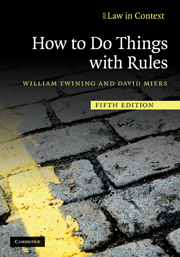Book contents
- Frontmatter
- Contents
- Preface
- Online appendices
- Acknowledgements
- Abbreviations
- Table of statutes and legislative instruments
- Table of cases
- Part I
- 1 Some food for thought
- Part II Reading, using and interpreting rules in general
- Part III Reading law: reading, using and interpreting legislation and cases
- Part IV
- Index
- Resources on the web
- References
1 - Some food for thought
Published online by Cambridge University Press: 05 June 2012
- Frontmatter
- Contents
- Preface
- Online appendices
- Acknowledgements
- Abbreviations
- Table of statutes and legislative instruments
- Table of cases
- Part I
- 1 Some food for thought
- Part II Reading, using and interpreting rules in general
- Part III Reading law: reading, using and interpreting legislation and cases
- Part IV
- Index
- Resources on the web
- References
Summary
Introduction
In this chapter we have collected together some concrete examples that illustrate the main questions and themes that are explored in the book as a whole. The purpose of presenting them at this stage is partly to generate interest and puzzlement, and partly to encourage you to start to think actively about some basic issues.
The first two sections illustrate the pervasiveness of law and other forms of ordering in the world at large and in our daily lives. The Newspaper Exercise should make clear how law not only features on every page of the newspaper but also serves as a lens for both interpreting and constructing ‘news’. Section 3 introduces the phenomenon of rule pluralism – the plain fact that each of us is subject to a multiplicity of legal and other orderings that coexist, interact and sometimes conflict with each other at many different levels from the global, regional and transnational down to the very local, such as your neighbourhood, your club and your living room. Both sections reinforce the point that, far from being an entirely new and strange subject, every beginning law student has had a wide experience of law as a party to contracts, as a family member, and as a student as well as a music pirate, copyright violator, debtor, trespasser, slanderer and almost certainly a criminal! Law and rules are everywhere and everyone has experienced them in many ways.
- Type
- Chapter
- Information
- How to Do Things with Rules , pp. 3 - 66Publisher: Cambridge University PressPrint publication year: 2010



